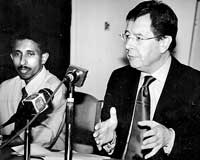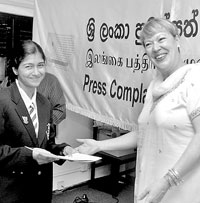
| No statutory Press Council for now
Media and Information Minister Anura Priyadharshana Yapa has told the visiting British Newspaper Editors Code Committee secretary Ian Beales that he saw no role in the foreseeable future for the statutory Press Council. Mr. Beales who met the Minister on Thursday said the Minister seemed very pleased the Sri Lankan press has taken the self-regulatory initiative and was proceeding with it and pledged his support for the process. “It was his view that the statutory Press Council had no role in the foreseeable future. But of course, these things can change. Governments can change, ministers can change,” Mr. Beales said. He said that in a statutory system, a government could order its own domestic newspapers not to report certain matters, but could not similarly restrict international TV and press reports on the same issue. This meant that people were forced to look to international TV and broadcasting to find out what was going on in their own countries - which had the effect of undermining public trust in that country's own newspapers, which was bad for the press and bad for democracy.
He said that donor funding will come for country's like Sri Lanka, simply to suggest that if international communities thought this was important enough for democracy, they will pour their money into it. Sri Lankans should take the hint. Mr. Beales said self regulation is seen internationally as a way in which you can have regulation of the press without it being threatening to the press. “It is important too that you had international donors for this project who have supported it because of what it would do for freedom and democracy and freedom of expression in Sri Lanka and I think the commitment of the press, the public and the Press Complaints Commission of Sri Lanka has made to this should be seen as vitally important not only for Sri Lanka but for the whole of the region,” he said. Mr. Beales said self-regulatory mechanisms exist quite widely in Europe and some areas in the world but it is quite innovative in Asia and Sri Lanka is actually leading the way.“It is setting the trend to other countries on how to regulate the press without threatening the press,” he said. Mr. Beales said that the four years since the PCCSL was launched, have marked a turning point for the Sri Lankan press as it meant the old system of the statutory Press Council in which the Government had a direct role was set aside and an independent system run by the press itself was put in place with the aim of giving the ordinary people a simple remedy for any grievances they might have had about the press. He said there were several reasons why you need some form of regulation in a modern democracy. “There is no one size that fits all models for self-regulation. Different models work in different places but in democratic systems this is the one which has worked the best in one or other format,” he said. “In an age where accountability is demanded by the press and the media of other institutions, it is probably not an option for the press itself not to be accountable,” Mr. Beales said. Readers need a system that they can trust to protect their interests and rights and that normally wouldn’t be a State system because State regulations are largely unacceptable in a modern democracy and certainly looks very bad in international terms,” he said. Mr. Beales is in Sri Lanka at the invitation of The Editors’ Guild and the Sri Lanka Press Institute. |
|| Front
Page | News | Editorial | Columns | Sports | Plus | Financial
Times | International | Mirror | TV
Times | Funday
Times || |
| |
Reproduction of articles permitted when used without any alterations to contents and the source. |
© Copyright
2007 | Wijeya
Newspapers Ltd.Colombo. Sri Lanka. All Rights Reserved. |

